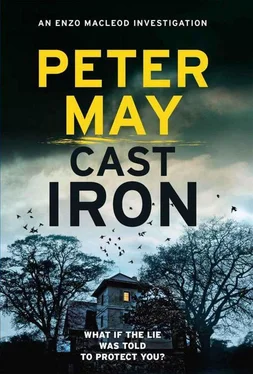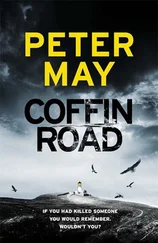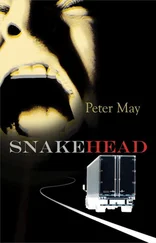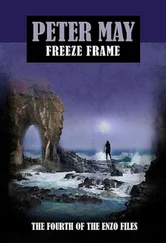He eased his way carefully along the wall until he saw the faintest light falling out over the path from one of the windows. It was almost opposite the tall pine. This had to be it. He reached it and dropped to his knees, peering down into the semi-darkness of the room below. The door stood wide open, light from the corridor beyond lying in a long slab of yellow across the floor. He saw the mattress they had slept on for the last three nights, and their blankets lying in a tangled heap. But the room was empty.
Almost at the same moment, he heard the sound of vehicle motors starting up at the front of the house, and he cursed audibly with the realisation that he was already too late. He scrambled to his feet, clutching his crowbar, determined to do battle with however many of them he had to, and sprinted as hard as he could around to the front of the house. In time to see all three vehicles accelerating away along the drive, headlights raking the darkness, one behind the other. Sheer frustration impelled him to throw his crowbar at their retreating brake lights and bellow into the night.
But they were gone. And they had Sophie with them.
They had left almost everything behind them in their haste to leave. Certainly they weren’t taking any chances that Bertrand would return quickly with help. The room on the ground floor, where they had clearly spent much of their time, was littered with food wrappers and beer cans, and ashtrays full to overflowing. The freezer in the kitchen was stacked with frozen meals that they had been cooking in a microwave, as well as the part-baked bread they had been feeding to Sophie and Bertrand. There was at least a week’s worth of yoghurt in the fridge. So they had been planning to be here for a few more days, at least.
There was a telephone in a back room, and for a moment Bertrand’s hopes were roused. But the line was dead, and he could find nothing in the house that gave a clue as to where in the world it was.
He went down to the cellars, through the room where the men had been playing cards, and along the corridor to the open door of the place that had been his and Sophie’s prison cell. He saw blood on the floor. Fresh blood, so he knew it wasn’t his. And feelings of rage and frustration and guilt so consumed him that he could barely breathe. Tears sprang to his eyes, and he turned and ran back up the stairs, the world blurring around him.
His footfalls in the hall echoed back at him from the walls, and he felt the cold again as he ran out and down the steps to the drive. His clothes were still wet, and he realised that he felt no pain because his body was mostly numb. All he could think was that he had to get help. That somehow he had to get word to Enzo. If anyone knew what to do now, it would be Sophie’s papa.
He fell into a long, loping stride as he followed the driveway through the trees and eventually out, through an open gate, on to a narrow, single-track road. Which way to turn? He tried to think back to their arrival in the van and the sharp turn into the drive, and he turned right.
The road was in poor condition, cracked and potholed, and took a long sweep around the perimeter of woods brooding darkly behind a high deer-fence on his right. On his left, flat, open country stretched away to an unseen horizon. He could see moonlight reflecting on fragments of water.
After fifteen minutes or so, his reserves of energy were starting to exhaust themselves, and his run had slowed to a walk. There were trees on both sides now, their shadows, cast by the moon, turning the ribbon of tarmac into a river of darkness, treacherous underfoot with its crumbling and pitted surface. Before suddenly he emerged into wide-open country, and in the far distance, away to his left, saw the headlights of cars on a road. A motorway, he thought, because they were travelling fast and straight. But it was a long way away. Three, maybe four kilometres, and there was no guarantee that the road he was on would lead him to it. The only way to be sure of reaching the highway was to go cross-country.
This was rough land, once forested but now cleared and overgrown, roots and tangling creeper making progress difficult, and it didn’t take Bertrand long, after leaving the road, to realise it could take him several hours to reach the motorway.
It was less flat than it had looked, and he found himself clambering over boulders and the remains of fallen trees. Then suddenly, in his haste, he pitched forward as the ground gave way beneath his feet. For a moment he felt the unconstrained freedom of falling through the air, before his head struck something very hard and he hit the ground with such force that, in the moments before he passed out, he was completely unable to draw a breath.
Sunlight fell across his bed, warming him even through the quilt. It had been a hot and restless night, in spite of falling temperatures outside, and now Enzo realised with a shock that he had slept until after nine.
He sat upright, blinking in the light of the bright southern sun that glanced off all the roman tiles of the rooftops beyond his window. His mouth was dry and his eyes gritty from too much wine consumed the night before. He slipped from his bed and walked stiffly into the bathroom to empty his bladder and splash his face with cold water. And as he pulled on fresh socks and underwear, and slipped into his trousers, he wondered why it was that age seemed always to be accompanied by pain — in muscles and joints and bones that had once moved freely and easily. As if it wasn’t bad enough just growing older.
He stumbled barefoot through the hall and into the séjour . Beyond the dining area, through the arch, he smelled coffee and warming croissants coming from the kitchen, and thought perhaps there were some advantages to having Nicole around, after all.
But he was stopped in his tracks by the sight of a large young man, busy, beyond the breakfast bar, taking pastries from the oven. He was tall and built like a rugby player, with dark hair tumbling in curls over his forehead. He turned and smiled at Enzo.
‘ Bonjour ,’ he said.
It took Enzo a moment to realise that it was Fabien, the young Gaillac winemaker whose dislike of Enzo had once led the two men to a confrontation in his vineyard that nearly ended in fisticuffs. In the final event, however, he had saved Enzo’s life, and so a truce had been declared, and each had a grudging respect for the other.
But seeing him standing there in the kitchen of his apartment, preparing breakfast, left Enzo at something of a loss. ‘What are you doing here?’
Fabien smiled. ‘Nice to see you, too, Monsieur Macleod.’ He dished up warmed croissants and pains au chocolat into a basket and started pouring two large cups of black coffee. ‘Nicole asked me to come and help with the party.’
Enzo had forgotten completely that Fabien and Nicole had formed the most unlikely of liaisons during his investigations in Gaillac, and it occurred to him that he had never asked Nicole if they were still together. But here, he thought, was his answer to the unasked question.
‘Oh,’ Enzo said.
Fabien pushed the basket of pastries towards him. ‘Always happy to be on the receiving end of a warm welcome.’
‘Sorry,’ Enzo said, still recovering himself. ‘Just surprised, that’s all.’
‘Ah, yes,’ Fabien said, and he took a slug of his coffee. ‘Speaking of which, Nicole has one for you. Something she’s been saving to tell you on your birthday.’
And Enzo remembered that he had forgotten, once again, that today was his birthday. ‘What?’
But Fabien just shrugged. ‘Oh, it’s not for me to say, Monsieur Macleod. Nicole would murder me if I spoke out of turn.’
Enzo could imagine only too well that she would. But he had no time to consider it further before Nicole herself bustled into the kitchen.
Читать дальше












